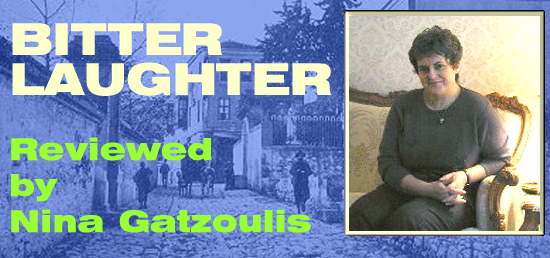 |
|||||
 |
|||||
| A few years ago my husband and I visited the island of Mytelene for the first time. While there, we visited many of the beautiful island's cities, villages and sites. Mytelene, Sapho's birthplace, otherwise known as Lesvos, has two pronounced geomorphic regions which offer breathtaking beauty to the visitor. At the western part of Lesvos one finds the island's celebrated Petrified Forest that dates back some fifteen million years. The fossilized trunks are unusual for the brilliance and diversity of their color. The predominant color however, is gray and there is no vegetation at all. Tree stumps are everywhere; some are fallen and some are still erect. The rest of Lesvos presents a different picture. Juxtaposing the gray color of the Petrified Forest with Mytelene's cities and villages, the visitor gets a different view. The remainder of Lesvos is immersed in green. The lush vegetation, the wildflowers, the herbs, the olives trees, the crystal blue waters of the Aegean, the white sandy beaches all blend together harmoniously and make up the beautiful island of Lesvos. Panagiotis Melemellis, in his Bitter Laughter, describes this green and luscious element of Lesvos -- especially at his native village of Vatousa -- so well. With the power of his pen, Melemellis transports his readers to his beloved birthplace: "Our most beautiful village with its amphitheater-like architecture is located at a prominent spot. The air we breathe is a blend of the sea breeze and the oxygen from the pine trees that guarantees a good night's sleep, unwinds the mind and rests the body..." writes Panagiotis in one of his descriptive short stories. As Melemellis explains, his book is "neither a novel nor fiction, but it consists of true stories of people of our island, people who toiled hard in the land and struggled to make a living". In a most descriptive way, Melemellis brings to life people and circumstances of a past era. He compiles his memories into several short stories. His village characters, unpretentious and unassuming, inhabit an period of sixty to seventy years ago in Vatousa and its surrounding areas. Vatousa becomes the microcosm where one is safe and secure, while the big city represents danger and loneliness. People travel to America only to make their fortune and come back to Vatousa and live happily ever after. Life in Vatousa, therefore, goes on as it had for several hundred years only to be interrupted once in a while by a scandal that brings upheaval to the every day life of the Vatousans. Sometimes humorous, often quite sad and sometimes tragic, the circumstances leave the reader either with a smile on his face, or tears in his eyes. With his Bitter Laughter, Panagiotis Melemellis manages to keep alive and bring near us an era that is gone. The author loves the world he grew up in. A multitude of people parade through his pages and with his pen he "paints" their simplicity, their faults, their cunnings, their craftiness and their human nature. Through his pages the reader will read about trades that now are lost due to the progress of modern technology and will become familiar with old sayings that were never written down before but rather were passed through the generations from mouth to mouth. WHO SHOULD READ BITTER LAUGHTER Bitter Laughter should be read by everyone who can read the Greek language, or who can manage to read the Greek language, because its language is very simple and unpretentious. Malamellis is very descriptive without using an "intellectual" vocabulary in his writing, and he keeps the reader's interest. Everyone from Lesvos, especially the Vatousans, should acquire this book for their libraries. It will bring back memories for the older people and the younger generations will appreciate Lesvos' unique and beautiful traditions and the culture of the island. THE NUTHOUSE Before World War II, the Metropolitan of Mytelene, Iakovos, founded a mental facility across Vostaneion with the capacity of treating sixty patients. He then sent a newsletter to the sixty mayors of the island instructing each village to send one mentally disturbed individual. The population of each village was not taken under account and thus the Metropolitan could avoid complaints of being unfair. Our own mayor K. Kostellas sent a mentally disturbed person from Vatousa to the newly established facility. The patient was quite disturbed to the point of being dangerous. For this reason, the policeman who escorted him tied him up. However, as soon as the bus arrived in Scalohori, the crazy person managed to open the door and disappear on the road to Kavouro. The policeman was worried that his superiors would punish him for letting the patient escape. The driver of the bus however, Andrew Kanelas, had the solution: "Palikar'," he shouted, "why are you worrying? Go down and capture another one, they are all crazy here. Who is going to know? Go catch one, we are leaving". |
|||||
2000 © Hellenic Communication Service, L.L.C. All Rights Reserved.
http://www.HellenicComServe.com
